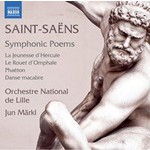
Saint-Saëns: Symphonic Poems
 $25.00
In Stock
add to cart
$25.00
In Stock
add to cart
CAMILE SAINT-SAENS
Saint-Saëns: Symphonic Poems
Orchestre National de Lille, Jun Märkl
[ Naxos / CD ]
Release Date: Friday 1 December 2017
A wide orchestral palette and stirring reserves of drama are used to evoke the youthful audacity and death of Phaéton, the ultimate triumph of virtue over pleasure in La Jeunesse d'Hercule ('The Youth of Hercules'), and Hercules' punishment, spinning wool while dressed as a woman, for the 'inadvertent murder' of one of his guests, in Le Rouet d'Omphale ('The Spinning Wheel of Omphale'). The ever-popular Danse macabre is a spooky depiction of Death playing a dance on his fiddle on a tomb in a graveyard surrounded by skeletal dancers. Conductor Jun Märkl specialises in twentieth-century French music for Naxos and has earned international plaudits for his multi-volume Debussy series as well as for his Ravel and Messiaen discs.
"Märkl's idiomatic and appealing accounts of every work on the programme and Dominic Wells' worthwhile notes, along with Naxos' modest price, make this CD an irresistible bargain." MusicWeb April 2018
"Märkl is fleet-footed, with delicate lightness to the harp and strings after the brassy introduction, woodwinds chattering vividly as the wild horses gallop away" Gramophone
"The performances from the Lille orchestra have a light Gallic touch about them and Märkl avoids burdening the music with thick textures and heaviness even in forte passages. That is fine judgement on his part. This is elegant music making. I have heard more edgy and demonic performances of Danse Macabre but in fairness, the conductor's approach to the piece fits in perfectly with the other three symphonic poems. The Naxos recording is first rate. This is highly recommended despite the rather short playing time by the label's usual standards." MusicWeb March 2018
"The performances from the Lille orchestra are lissom and deft, and Märkl never attempts to overload his reading with portentousness. The four symphonic poems are interspersed with a suitably rousing Marche Héroïque composed during the siege of Paris in 1870 and, more interestingly, a Sarabande and Rigaudon from the 1890s, which Saint-Saëns wrote for his new edition of Charpentier's comédie-ballet Le Malade Imaginaire. Like everything here, they are immaculately polished miniatures, which do exactly what they are intended to do." The Guardian
Tracks:
Phaéton, Op. 39
Marche héroique, Op. 34
La jeunesse d'Hercule, Op. 50
Le Rouet d'Omphale, Op. 31
Sarabande et Rigaudon, Op. 93
Danse macabre, Op. 40